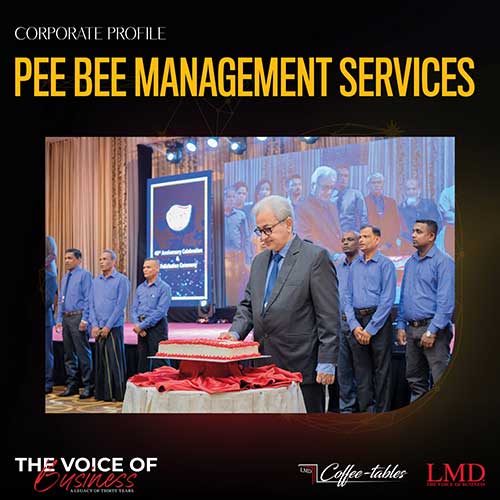LOLC HOLDINGS

Group Managing Director/CEO
Q: Could you outline how the group has contributed to nation building?
A: LOLC was incorporated in 1980 as the pioneering leasing company to stimulate the growth and fulfil the financial requirements of the SME sector in Sri Lanka. Since its inception, the LOLC Group has been a cornerstone in Sri Lanka’s nation building efforts through its multifaceted contributions across diversified sectors.
Our flagship financial services company LOLC Finance has continued to play a pivotal role by providing comprehensive and flexible financial solutions to individuals and businesses ranging from micro enterprises to large SMEs, thereby becoming a catalyst of economic growth.
Complementing the finance company, LOLC Life Assurance and LOLC General Insurance provide an encompassing safety net to individuals as well as businesses through a comprehensive portfolio of insurance products.
Agriculture plays a pivotal role in the socioeconomic fabric of Sri Lanka, encompassing food security, employment creation and foreign exchange generation. Brown & Company has been at the forefront of providing mechanisation and automation solutions to the agri sector in Sri Lanka. Agstar is among the market leaders in providing quality seeds and agri inputs to the sector as well.
Through Browns Investments – which holds Maturata, Udapussellawa and Hapugastenne Plantations – the LOLC Group is the largest producer of made tea for export in Sri Lanka, generating much needed foreign exchange for the country.
Furthermore, Galoya Plantations is the largest employment provider in the Ampara District and largest sugar producer in the country, saving the outflow of foreign currency through import substitution.
Tourism is a key component of the nation’s economy with tourism earnings in 2023 estimated to be over US$ 2 billion, supporting Sri Lanka’s economic recovery. Through Browns Hotels & Resorts, the group’s leisure properties consist of over 900 keys across three, four and five-star resorts, and luxury boutique hotel facilities in strategic locations around the country, creating a unique experience for its guests.
Further, it is important to explore new technologies and encourage innovation for the country to remain competitive in a dynamic environment. Through LOLC Advanced Technologies, the group has created an incubator that fosters cutting-edge research and innovation, with a focus on creating value addition in minerals and agricultural products.
Q: How would you describe your group’s journey over the last three decades? And what were the major milestones during this time?
A: Over the last three decades, the LOLC Group has transformed from a local financial services provider into a global conglomerate with a presence in multiple sectors and countries. Our journey is marked by several significant milestones.
One of the most significant would be the commencement of our global expansion, notably in South and Southeast Asia, Central Asia and Africa. The LOLC Group is now in a global leadership position for micro, small and medium-sized enterprise (MSME) financial services.
The Divi Saviya educational initiative – supporting over 4,000 schools and set to cover 40 percent of schools in the country by completion – exemplifies our commitment to social responsibility.
Q: In your opinion, what is the role of corporates such as yours in reviving Sri Lanka’s economic and social landscape?
A: Corporates like the LOLC Group play a vital role in reviving Sri Lanka’s economic and social landscape. By driving growth across diverse sectors, we create job opportunities, foster innovation and support MSMEs, the backbone of the economy. Our investments in technology such as digital banking solutions and precision agriculture enhance efficiency and productivity, contributing to economic resilience.
The LOLC Group’s interests include financial services, insurance, agriculture and plantations, manufacturing and trading, leisure, ICT and advanced technologies, construction, mining and investments including several groundbreaking projects in Port City Colombo.
By adhering to environmental, social and governance (ESG) principles, we ensure sustainable growth and long-term positive impact, aligning our business objectives with national development goals.
By leveraging our strengths and embracing new opportunities, we aim to create lasting value for our stakeholders

Q: What is your outlook for Sri Lanka over the next five years?
A: Over the next five years, we anticipate a gradual but steady economic recovery in Sri Lanka, driven by policy reforms, increased investments and enhanced infrastructure development. The economy is expected to diversify with growth in sectors such as technology, renewable energy and tourism. Socially, improvements in education and healthcare will foster a more resilient and skilled workforce.
Politically, stability and effective governance will be crucial for sustained growth. We foresee significant infrastructure advancements including Port City Colombo, and improvements in the transport and energy sectors. These developments will enhance Sri Lanka’s global competitiveness and support long-term economic growth.
Q: The most important goals for corporates in Sri Lanka to achieve in the medium term are…
A: In the medium term, the most important goals for corporates in Sri Lanka include fostering sustainable growth, enhancing operational efficiencies through technology and contributing to social development. Prioritising ESG principles will ensure long-term sustainability and positive societal impact.
Corporates must also support the development of a skilled workforce through continuous learning and development initiatives, addressing the talent gap and ensuring future growth.

Q: How does your group view the talent in the country in the wake of the brain drain?
A: Talent migration is a significant concern but we view it as an opportunity to innovate and adapt. We are committed to creating an environment that attracts and retains talent by offering competitive benefits, continuous learning opportunities and a supportive work culture.
The adoption of hybrid work models has allowed us to maintain productivity while providing employees with a better work-life balance. We invest in training and development programmes to upskill our workforce, ensuring that we remain competitive and can mitigate the impact of talent migration.
Our ESG philosophy is deeply embedded in our operations and strategic decisions. We are dedicated to minimising our environmental footprint through sustainable practices

Q: Can you share your group’s philosophy regarding ESG?
A: Our ESG philosophy is deeply embedded in our operations and strategic decisions. We are dedicated to minimising our environmental footprint through sustainable practices such as optimising resources and investing in renewable energy projects.
Socially, we focus on community development, education and employee wellbeing, ensuring that our growth benefits society at large.
Our governance practices are centred on transparency, accountability and ethical conduct, ensuring that we maintain the trust of our stakeholders and operate with the highest standards of integrity.
Q: What is the role of technology in your group and its operations? And how has this role evolved through the years?
A: Technology plays a central role in our group, driving innovation, efficiency and growth. Over the years, we have integrated technologies across our operations, from financial services to agriculture and leisure.
LOLC Finance’s success for example, is underpinned by its digitalisation road map, which enhances customer convenience and operational efficiency. Services such as iPay, the Real Time mobile app and internet banking enable customers to access financial services seamlessly while omni-channel solutions allow them to switch channels effortlessly.
In agriculture, we leverage artificial intelligence and data analytics for precision farming and improved productivity. The role of technology has evolved from a support function to a strategic enabler, allowing us to remain competitive and responsive to market changes.
Our governance practices are centred on transparency, accountability and ethical conduct, ensuring that we maintain the trust of our stakeholders

Q: And what are your group’s plans for the future?
A: Our plans for the future include continued global expansion and diversification of our portfolio. We aim to enter new markets such as Ghana and Congo, and further consolidate our presence in Central Asia.
We are also exploring opportunities in technology driven solutions.
In financial services, LOLC Finance will continue to enhance its customer-centric approach by investing in digital technologies and expanding its comprehensive financial services product portfolio.
Our strategic focus on key growth drivers such as the leveraging of our leisure properties and further advancements in our agricultural initiatives positions us for strong growth from 2024 onwards.
By leveraging our strengths and embracing new opportunities, we aim to create lasting value for our stakeholders, and contribute positively to Sri Lanka’s economic and social development.
Globally, we continued to consolidate our footprint with a presence in Sri Lanka, Cambodia, Myanmar, Indonesia, the Philippines and Pakistan. We have also entered the Rwandan market in East Africa, expanding our financial services sector operations.
Our operations now span North Africa (Egypt), East Africa (Kenya, Tanzania, Rwanda, Malawi, Zambia and Zimbabwe) and West Africa (Nigeria), with licences expected for Ghana and Congo in 2024. In Central Asia, we operate in Tajikistan, Kyrgyzstan and Kazakhstan, and are exploring further opportunities to consolidate the Central Asian market by entering an additional country.
– Compiled by Yamini Sequeira
Telephone: 5880880 | Email: info@lolc.com | Website: www.lolc.com





